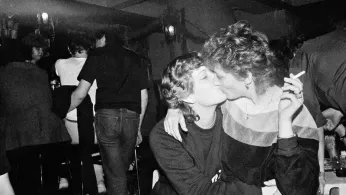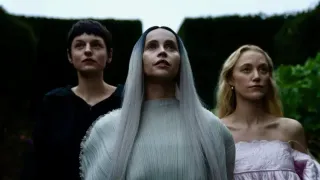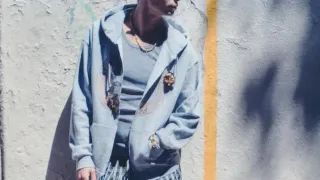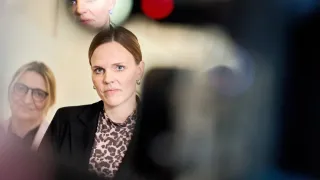
4 hours ago
Let-It-All-Hang-Out Liberation: The Queer Legacy of Libuše Jarcovjáková in ‘I’m Not Everything I Want to Be’
READ TIME: 3 MIN.
Step into the smoke-filled rooms and neon-lit corners of 1970s and ’80s Prague, where the real party began after the world shut its doors. This wasn’t just nightlife—it was an act of resistance. Photographer Libuše Jarcovjáková, often hailed as “the Nan Goldin of Czechoslovakia,” wielded her camera as a beacon for the unseen and the unspoken, chronicling the vibrancy and vulnerability of the underground LGBTQ+ scene that thrived despite the iron grip of communist normalization and legal persecution.
Klára Tasovská’s documentary, ‘I’m Not Everything I Want to Be,’ is not a sanitized retelling. Instead, it’s a pulsing, bittersweet testament—a mashup of indelible photographs and confessional narration, where every frame aches with the longing, lust, and laughter of a community determined to let it all hang out in a world that insisted on keeping them in the shadows.
What makes Jarcovjáková’s work so vital—so instantly relatable to queer audiences—is not just the explicitness of her subject matter, but the intimacy. Her photographs of gay clubs, clandestine lovers, and working-class revelers are at once fiercely political and deeply personal. Each image is a love letter to defiance, a snapshot of joy snatched from the jaws of repression.
In the documentary, we hear Jarcovjáková’s own voice—sometimes raw, sometimes reflective—as she guides us through the world she documented. “This film is as much a tribute to the artistic process and curiosities of a photographer as it is a revealing portrait of her existence, forming an unconventional but deeply moving coming-of-age story,” reads one festival review—a sentiment that resonates with anyone who’s ever had to create their own community when the world refused to see them.
For Jarcovjáková, the camera was a confessional booth, a shield, and a sword. Her artistry was survival; her photographs, a declaration: “We are here, and we are glorious.”
‘I’m Not Everything I Want to Be’ is not just a period piece—it feels radical and urgent, especially for a new generation of queer viewers. The film premiered at the Berlin International Film Festival, winning LGBTQ+ awards from Fierté Montréal and Lyon’s Écrans mixtes, and was chosen as the Czech Republic’s submission for the Best International Feature Film at the 98th Academy Awards. Its global recognition underscores how stories of queer resistance, even from decades past, resonate across borders and eras.
Jarcovjáková’s journey—her quest for freedom after the suppression of the Prague Spring, her immersion in the wildness of queer nightlife, her refusal to be defined by regime or gender—mirrors the ongoing fight for LGBTQ+ rights worldwide.
The film doesn’t shy away from the messiness—the shame, the desire, the danger. It celebrates the power of queer storytelling to heal and to provoke, inviting audiences to witness not just the parties but the cost of visibility. In a Q&A following a recent screening, Tasovská and Jarcovjáková discussed how art can “create space for empathy and transformation,” urging us to see the past not as distant, but as a living call for solidarity.
For LGBTQ+ viewers, especially those who came of age after the Velvet Revolution, Jarcovjáková’s story offers both a mirror and a map. It’s a reminder that queer joy and love have always existed—even when the world was not ready to admit it. Her refusal to be everything anyone else wanted her to be is a rallying cry for authenticity, for art as activism, and for the preservation of queer history in all its messy, radiant glory.
Tasovská’s documentary is urgent viewing: a vibrant, cathartic, and deeply personal celebration of a community’s resilience. In the words of a festival critic, it’s “as much a tribute to the artistic process and curiosities of a photographer as it is a revealing portrait of her existence”.
In a year when anti-LGBTQ+ rhetoric still echoes worldwide, ‘I’m Not Everything I Want to Be’ lands with the energy of a midnight dance floor and the intimacy of a whispered confession. It’s a film for anyone who has ever wanted to be more—and for everyone who insists on being seen.






